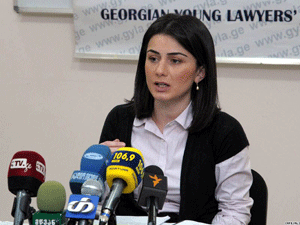Gela Mtivlishvili
The Georgian Young Lawyers Association (GYLA) blames the Parliament of Georgia in breaching the regulations when introducing amendments to the Criminal Procedural Code of Georgia. According to the GYLA, the above-mentioned amendment can be declared unconstitutional based on the Organic Law of Georgia about Constitutional Court.
According to the GYLA, in September of 2010, before the new Criminal Procedural Code of Georgia was put in force, the parliament of Georgia introduced amendments to the procedural code through the violation of the principles estimated by the regulations of the parliament of Georgia behind the closed doors. Thus, the interested parties were deprived of the right to express or protect their opinions about the amendments to the project.
“Although the ministry of justice presented the packet of amendments on September 1, the society had no access to the version of the draft-amendments submitted to the parliament,” said the chairwoman of the GYLA Tamar Khidasheli.
She added that the transparency of the legislative procedures is very important because the legislative amendments might change the rights and freedoms of every citizen.
“Unfortunately, the amendments to the Procedural Code worsen the situation of the accused; it reduces the standard of conviction in regard with the accusation and acceptability of certain forms of allegations. For example, before the amendments, confession of the accused could not be basis for the accusation unless it was proved by other evidence but according to the amendments the person can be accused based on one prove besides his confession. The introduced amendments reduce the number of votes of juries when passing the final judgment and it reduces the standard of conviction. The amendment introduced plea-agreement about particular cooperation without corresponding protection of the interests of the convicted and others,” said Khidasheli.
The GYLA is particularly concerned by the fact that the amendments to the Criminal Procedural Code of Georgia were introduced through the violation of the regulations.
“According to the information provided by the parliament, most of the amendments to the Code were not discussed by the parliament of Georgia at the first hearing. The parliament enacted it at the second and third hearing through violation. Article 19 – “a” of the Organic Code of Georgia on the Constitutional Court can be basis to declare the abovementioned amendments unconstitutional. However, the GYLA cannot bring suit against amendments. According to the Article 33 of the Organic Code of Georgia on the Constitutional Court only president of Georgia, government or one fifth of the MPs are authorized to appeal against the amendments,’ stated the representatives of the GYLA.
The members of the Legal Committee of the Parliament of Georgia stated they do not have information about the complaints of the GYLA.
According to the GYLA, in September of 2010, before the new Criminal Procedural Code of Georgia was put in force, the parliament of Georgia introduced amendments to the procedural code through the violation of the principles estimated by the regulations of the parliament of Georgia behind the closed doors. Thus, the interested parties were deprived of the right to express or protect their opinions about the amendments to the project.
“Although the ministry of justice presented the packet of amendments on September 1, the society had no access to the version of the draft-amendments submitted to the parliament,” said the chairwoman of the GYLA Tamar Khidasheli.
She added that the transparency of the legislative procedures is very important because the legislative amendments might change the rights and freedoms of every citizen.
“Unfortunately, the amendments to the Procedural Code worsen the situation of the accused; it reduces the standard of conviction in regard with the accusation and acceptability of certain forms of allegations. For example, before the amendments, confession of the accused could not be basis for the accusation unless it was proved by other evidence but according to the amendments the person can be accused based on one prove besides his confession. The introduced amendments reduce the number of votes of juries when passing the final judgment and it reduces the standard of conviction. The amendment introduced plea-agreement about particular cooperation without corresponding protection of the interests of the convicted and others,” said Khidasheli.
The GYLA is particularly concerned by the fact that the amendments to the Criminal Procedural Code of Georgia were introduced through the violation of the regulations.
“According to the information provided by the parliament, most of the amendments to the Code were not discussed by the parliament of Georgia at the first hearing. The parliament enacted it at the second and third hearing through violation. Article 19 – “a” of the Organic Code of Georgia on the Constitutional Court can be basis to declare the abovementioned amendments unconstitutional. However, the GYLA cannot bring suit against amendments. According to the Article 33 of the Organic Code of Georgia on the Constitutional Court only president of Georgia, government or one fifth of the MPs are authorized to appeal against the amendments,’ stated the representatives of the GYLA.
The members of the Legal Committee of the Parliament of Georgia stated they do not have information about the complaints of the GYLA.
News
December 13, 2023
Ethnic minorities outside the peace dialogue
November 6, 2023
‘Peace’ agenda of political parties
Popular
Articles
February 13, 2024




